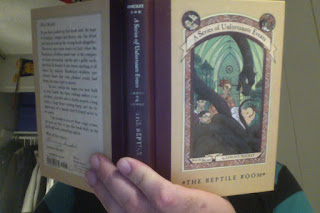A Year of Unfortunate Events — Part the Second: The Wrath of Beatrice
Here we are, the second entry in my attempt to re-read all thirteen entries in Lemony Snicket's "A Series of Unfortunate Events" over the course of a year-ish. I hope you've had a good month. Before we jump in, just a reminder, this will contain the dreaded SPOILERS. So, if you haven't read these books, yet, just know that I'm not going to be making any concessions to you.
You don't have to be so rude about it.
No, I don't.
Book the Second - The Reptile Room
What did you remember about this book before re-reading it?
Well, I remember this book as being the only one in which the Baudelaires are in the care of a truly likable guardian: their Uncle Monty. Monty is a kindly herpetologist with a sense of irony who warmly welcomes our orphaned heroes into his home. It also introduces one of the series' main tropes: Count Olaf wearing a terrible, completely transparent disguise which somehow only the Baudelaires can see through. So, yeah, that's about what I remember.
Not much to go on.
‾\_(ツ)_/‾
Now that you've read it again, what did you think?
So, it's good but, um, remember last time when I said that the series as a whole is a parody of children's adventure series?
Of course I remember.
Good. So, in order to be effective, parody has to replicate the form of the work being parodied.
Obviously.
This means that the first several books in the series get a little repetitive. But maybe I'm getting ahead of myself. Back to The Reptile Room. So, the Baudelaire orphans once again find themselves in the care of a distant relative: herpetologist Doctor Montgomery Montgomery, or Uncle Monty as he prefers to be called. Uncle Monty turns out to be the ideal guardian, with clever reptile traps for Violet to work on, a vast library for Klaus to research in, and numerous hard objects for Sunny to bite. He also possesses a keen wit and loves zombie movies. (Sidebar: When will the fictive zombie film entitled Zombies in the Snow be produced IRL? It sounds redonkulous!)
So basically everyone's ideal nerd-dad?
That's right. He's even planning on taking the orphans on an expedition to collect samples in Peru.
It seems like that might not be the best thing to do immediately after adopting three children.
Maybe not, anyway, his assistant Gustav has recently quit and been replaced by a man named Stephano who bears a striking resemblance to Count Olaf. By which I mean the children can immediately identify him as Count Olaf because all he did was shave his head – unibrow included – and grow a beard. So not a great disguise. He doesn't even think to cover up his ankle tattoo with make-up until after the children already know it's him.
But the grown-ups fall for it?
Congrats, you win the no-prize. In any case, the good news is that Monty thinks Stephano is up to something. The bad news is that he thinks that something is stealing Monty's research. The better news is that Monty rips up Stephano's steamer ticket to Peru. The worse news is that the very next morning, Monty is found dead, apparently of a snakebite.
But it's actually murder, right?
Oh, definitely, this is actually the first of many homicides that Olaf will commit throughout the series. Don't worry, though, he always gets away with it in spite of those meddling kids. That's right, the kids are able to finally expose Stephano as Count Olaf, only to see him escape with the help of the hook-handed man, who disguised himself as a medical examiner by wearing wooden prostheses over his hooks. A reveal that is foreshadowed by Snicket's frequent reference to the doctor's oversized hands.
So that's two twist-endings-foreshadowed-by-frequent-references-to-hands in as many books?
You have a keen eye for detail Hypothetical Reader.
So, speaking of Mr Snicket, are there any particular linguistic or allusive jokes you want to draw attention to in this book?
Of course, I specifically want to mention the page of evers.
Pardon me?
I'll show you a picture:
See, the previous page ends by saying: "We all know, of course, that we should never, ever, ever," and then the page of evers and then "fiddle around in any way with electric devices."
That's cute.
I know, right? Snicket also teaches young readers the expression: "Meanwhile, back at the ranch," and then proceeds to use it any time the narrative switches perspective.
Truly, knowledge is a treasure.
Well, that is one of the morals of the story.
How outré.
Well, yeah, I guess kids who're into reading might not need a reminder of the value of knowledge.
I'm just joshin' ya. So. . . does that wrap things up for this month?
I guess so. Join us next month for a discussion of The Wide Window.
Links:
Here's the Gothic Archies' "In the Reptile Room" from the audiobook.
We still didn't talk Daniel Handler.
Who?
You know, the series' real author.
What are you talking about? The author is clearly listed as Lemony Snicket.
I feel like you're being intentionally obtuse.


Comments
Post a Comment